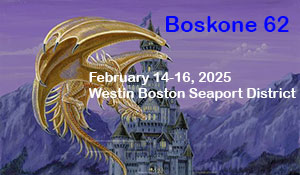When I first arrived at MIT in 1957 and joined the MITSFS we would go to Chinatown every Friday after the meeting to eat. Originally, we ate at Yee Hong Guey on Oxford Street but later moved to The House of Roy at 12a Tyler Street. Later, NESFA continued this practice, usually traveling to the Baskin-Robbins store in Belmont Center for ice cream and then spending the evening at our place (we were smoffing even though that verb did not seem to have been invented yet).
Roy's, as we called it, was a weird place. The menu stated "no rolls, no chop suey, no chow mein — this is a Chinese restaurant." We ate there for about 13 years until the death or retirement of the owners caused it to be replaced by an inferior eating place. There has been much turnover since then; the last time I looked it was a Vietnamese restaurant [as of June 2007 it was a travel agency].
The restaurant had two rooms side by side, one of which had the entrance to the street and the cashier. We were always put in the back room-"so nice people not see you and be frightened away." The floor were either linoleum or tile, the walls were painted in a color similar to the MIT basement corridors — usually referred to as monkey-vomit green — and the tables were topped with formica and no table cloths. The only reason anyone would eat there was that the food was excellent.
After we were an established group the concept of menus and ordering changed. We would just come in, sit down, and tell the waiter the number of people-feed 12, for example. They enjoyed making dishes for us that the average American of the time (1960s) would never have thought of. One of our favorites was something that sounded like "hom ong liu biang" which was minced pork steamed in duck egg. It was very popular. Less so was the bitter melon with Chinese vegetables which was too bitter for our tastes. Other popular dishes were butterfly shrimp (a tempura-like concoction), chicken with almonds, and beef with snow peas, and beef with lotus root.
Every so often a new member of the group would ask for a menu and be told "No" by the waiters. Chopsticks were the default utensils although, if asked for Western implements, such would be brought from the kitchen, presented, and a number of the staff would gather around to watch that person eat making — we believed — rude remarks in Chinese. If you ever read MAD's "Two Chinese Guys Visit An American Restaurant" you will know exactly what I mean.
One time Lester del Rey was in the area (maybe it was a Boskone) an we wanted to impress him with the authenticity of the food. Roy had previously told us the food was not authentic — "For most Chinese, bowl of rice; fish head if you lucky." However, when Lester was there we asked if the food was authentically Chinese and were told, "yes." Then someone asked if the water being poured from the pitcher was "real Chinese water." The waiter was nonplused for a moment but then said shamefacedly, "No, Japanese water — much cheaper. But good enough for you."
At one point, after Suford had joined the group, we asked for tea and Roy (we think this was the family name) told Suford she would be allowed to go into the kitchen and make it for us. When she returned she informed us that the kitchen was ruled over by a large tom cat. ["Did you pet him?" "No, he was on duty."] When we queried the owner his response was that the cat kept down vermin and was safer than chemicals. We asked about the Health Inspector and were told "cat cleaner than Health Inspector."
One weekend we told Roy that we would not be there the next weekend because we were going to a science fiction convention in Philadelphia. He looked at us in astonishment and said, "Going to Philadelphia — serve you right!" When asked to recommend a Chinese restaurant there, he deferred, saying, "are none." Which, as you all know, is not strictly true; there are many excellent restaurants in Philadelphia.
As people moved to the suburbs there was less regular visitations although Joe Ross often took The Other Club there for dinner. When Roy's closed, it was the end of an era. Sure, other restaurants had as good food, but not the ambience nor panache of Roy's.
Sic semper gloria mundi.







 Donate to NESFA
Donate to NESFA